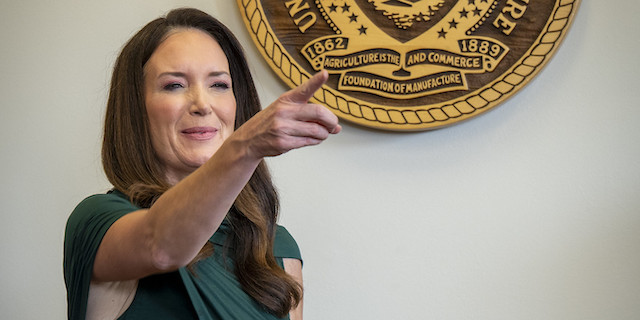Oregon’s ag committee caucus: Reps. Salinas and Chavez-DeRemer talk farm bill
Published 3:45 pm Friday, April 14, 2023

- Left, Rep. Andrea Salinas, a Democrat representing Oregon’s 6th Congressional Distrct. Right, Rep. Lori Chavez-DeRemer, a Republican representing Oregon’s 5th Congressional District.
With the 2018 Farm Bill set to expire on Sept. 30, Congress is racing to pass a new farm bill.
Two first-term members of Congress representing Oregon’s Willamette Valley — one Democrat and one Republican from neighboring districts — will help shape this year’s farm bill as members of the U.S. House Agriculture Committee.
In November, voters elected Democrat Andrea Salinas to represent Oregon’s 6th Congressional District. From 2017 to 2022, Salinas, the daughter of a Mexican immigrant farmworker, represented District 38 in the Oregon House of Representatives.
Voters in Oregon’s 5th Congressional District elected Republican Lori Chavez-DeRemer. From 2010 to 2018, Chavez-DeRemer was the first Latina mayor of Happy Valley, Ore.
Both Salinas and Chavez-DeRemer asked to be assigned to the House Agriculture Committee.
“I lobbied pretty hard to get on the ag committee because my district has so much ag in it,” said Salinas.
“I asked because I thought it was important to represent Oregon’s needs, and certainly it fits my district,” said Chavez-DeRemer.
Capital Press talked with Salinas and Chavez-DeRemer about their agricultural policy goals.
Crop insurance
Salinas and Chavez-DeRemer said farmers need stronger safety net programs.
“Whether you call it a safety net or certainty, they (farmers) just want to know what we’re doing in order to keep them stable as they feed the world,” said Chavez-DeRemer.
One title, or subsection, of the farm bill subsidizes crop insurance, which farmers rely on when something goes wrong, such as a natural disaster spoiling a crop.
Chavez-DeRemer and Salinas said USDA’s crop insurance offerings do not meet specialty crop producers’ needs and said their No. 1 priority is to push for better specialty crop insurance options.
“They (specialty crop growers) have been left out of the farms bill in terms of a safety net, essentially, and it’s simply not fair,” said Salinas.
Nutrition
Although the lawmakers share many common priorities, they part ways on some nutrition policies.
The Congressional Budget Office, or CBO, forecasts the nutrition title, including SNAP food stamps, will make up 82% of the 2023 Farm Bill.
Recently, Chavez-DeRemer co-sponsored a bill in Congress to tighten SNAP work requirements. Chavez-DeRemer said the bill would “modernize” SNAP, encouraging employment while also meeting people’s needs.
Salinas is wary of the proposal.
“We’re still in an inflationary crisis. Groceries are still really expensive. Now is not the time to take food out of someone’s mouth,” she said.
Forestry
Salinas and Chavez-DeRemer have seats on the House’s forestry subcommittee, but neither is pushing for specific forestry appropriations yet.
Chavez-DeRemer said she plans to learn about forestry policy from more senior members of Congress, including Rep. Cliff Bentz, a Republican representing Oregon’s 2nd Congressional District. Chavez-DeRemer said Rep. Bruce Westerman, from Arkansas, told her: “I’m gonna make a tree girl out of you yet.”
Broadly, Chavez-DeRemer said she supports managing forests and reducing fuel loads.
Salinas said she supports “sustainable thinning” to promote healthy forests and wildfire resilience.
What does sustainable thinning mean to Salinas?
“I don’t think it is a one size fits all because of the ecological parameters and the conservation parameters that we want to see. But you know, different regions require different approaches,” she said.
Trade
Salinas and Chavez-DeRemer support using taxpayer dollars to promote exports of U.S. farm goods, such as through USDA’s Market Access Program, or MAP.
“We have to move our goods and services in and out,” said Chavez-DeRemer. “…Trade promotion? That’s the key. We have to support that.”
Salinas made a similar comment, but with a caveat: “How do we make sure we have a footprint in the global market? By ‘we,’ I mean the Pacific Northwest. Right now, we’re not a big part of those (trade promotion) programs. So for me, if we were to expand it, I would want to make sure Oregon and the Pacific Northwest has a unique voice.”
Big spending
The CBO estimates the 2023 Farm Bill could cost an average of $150 billion a year — the most expensive farm bill on record.
Critics says they are concerned about the federal government’s “runaway spending.” How do Salinas and Chavez-DeRemer feel about the farm bill’s price tag?
“I think we are in a crisis situation right now with climate,” said Salinas. “And so, I think in order to start to turn the corner on climate, we have to make the investment now.” She named conservation programs the farm bill will support as examples of good investments.
“I don’t think there’s anyone in Congress, Democrat or Republican, who wants to waste money,” said Chavez-DeRemer. She said the farm bill is worth investing in but added that she will be thoughtful about appropriations.
Pesticides
Salinas recently introduced legislation in Congress that would promote research into advanced crop protection methods, such as biological pest control.
Although Salinas supports boosting pesticide alternatives, she said farmers should have viable alternatives before the government bans certain pesticides.
“We can’t put the cart before the horse,” she said. “We can’t be hurting someone’s livelihood before we have an effective alternative for someone to use.”
Chavez-DeRemer said she is unfamiliar with specific pesticides but is open to learning from farmers. Broadly, she does not support blanket policies and “layers of regulation.”
Listening session
Chavez-DeRemer and Salinas said they have invited Rep. Glenn “G.T.” Thompson, the chair of the House Agriculture Committee, to visit Oregon for a farm bill listening session, and he has agreed to come in May or June. The representatives encourage farmers to attend.






